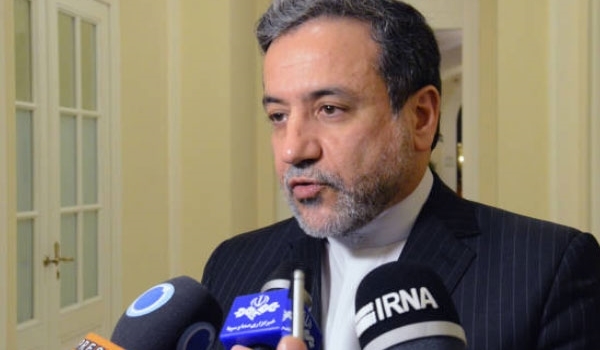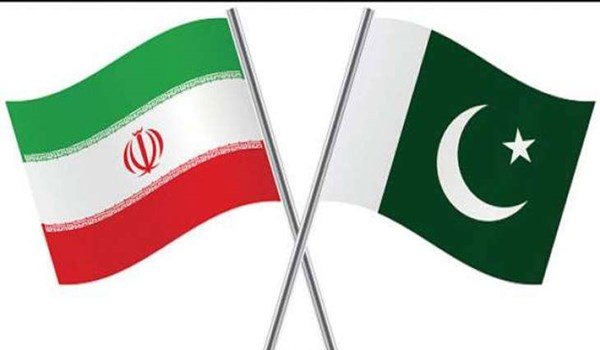
Iran, Pakistan Pledge to Promote Commercial Ties


Tehran and Islamabad, during the Monday meetings of Araqchi with Pakistan’s Foreign Minister Shah Mahmood Qureshi, Foreign Secretary Tehmina Janjua, and Chairman of Pakistan Senate's Foreign Relations Committee Mushahid Hussain, stressed the importance of promoting bilateral ties anchored in religious and socio-cultural affinities,
Heading a senior diplomatic delegations, the Iranian diplomat visited Islamabad on Monday to attend the 10th round of the Pakistan-Iran Bilateral Political Consultations.
In the separate bilateral meetings, Iranian deputy foreign minister and Pakistani officials and exchanged views on other important regional and international issues including the situation following the US’ unilateral withdrawal Iran’s nuclear deal, the situation of human rights in Kashmir, and the conflict in the Middle East countries.
During the talks, both sides stressed the importance of promoting bilateral ties anchored in religious and socio-cultural affinities, and exchanged views on other important regional and international issues including the situation following the US’ unilateral withdrawal Iran’s nuclear deal, the situation of human rights in Kashmir, and the conflict in the Middle East countries.
Both sides agreed to hold the 21st Session of the Joint Economic Commission early next year.
In particular, measures to enhance bilateral trade to achieve the annual target of USD 5 billion through facilitation of business communities, scaling down of trade barriers and speedy progress on facilitating preferential trade were discussed in detail.
The two sides also agreed on the need to further improve railway connectivity between the two countries.
The Pakistan-Iran Bilateral Political Consultations are one of the several important institutional mechanisms to regularly review and chart the way forward in various areas of cooperation.
The meetings are aimed at providing the opportunity to review the progress made under various mechanisms concerning consular, economic, trade and border related issues between the two sides.
Following the meetings in Islamabad, Pakistani Foreign Ministry issued a statement recounting that Iran and Pakistan have agreed to enhance bilateral trade to achieve the annual target of US $ 5 billion through facilitation of business communities, scaling down of trade barriers and speedy progress on facilitating preferential trade.
“Bilateral Political Consultation between Iran and Pakistan is one of the several important institutional mechanisms to regularly review and chart the way forward in various areas of cooperation,” the statement said.
It added during the meeting, both sides expressed satisfaction at the continuing warmth in the bilateral relationship anchored in religious and socio-cultural affinities.
“In addition, a long ‘border of friendship’ between the two countries has provided a means for regular people-to-people contacts over the centuries. In recent years, both countries have also provided each other principled support on the issues of Kashmir and the JCPOA,” the statement noted.
It added Iran and Pakistan are close neighbors enjoying similarity of views on most regional and international issues.
It further said Bilateral Consultations provided the opportunity to review the progress made under various other institutional mechanisms concerning consular, economic, trade and border related issues between the two sides.
“In particular, measures to enhance bilateral trade to achieve the annual target of US $ 5 billion through facilitation of business communities, scaling down of trade barriers and speedy progress on facilitating preferential trade were discussed in detail,” it said.
The statement added both sides agreed to hold the 21st session of the Joint Economic Commission early next year. “Both side agreed on the need to further improve railway connectivity between the two countries,” it said.
It said ways and means were also discussed to facilitate the growing number of pilgrims traveling every year to Iran from Pakistan.
The statement went on to say Pakistan and Iran, as the major geographic neighbors of Afghanistan also have commonality of views and future approach to restore complete peace and stability in the country.
“Both the countries have been affected adversely due to the 40-year old conflict and instability in Afghanistan which has resulted in serious challenges including millions of Afghan refugees, the narcotics trade, illegal migration and the rise of new terrorist outfits like ISIL in the war ridden country,” it said.
It was noted that fully supporting an Afghan-owned Afghan-led peace and reconciliation process was the best way to overcome the serious security and politico-economic challenges faced by Pakistan and Iran. A coordinated approach in this regard was important to safeguard the core interests of both Pakistan and Iran in this situation.
The statement said during the meeting views were also exchanged on other important regional and international issues including the situation following the US unilateral withdrawal from JCPOA, the situation in Kashmir, and the conflict in the Middle East.
In a relevant development in early December, Iranian and Pakistani officials in a meeting in Karachi underlined the need for broadening mutual cooperation between the two countries.
During the meeting in Karachi, Iranian Ambassador to Pakistan Mehdi Honardoust and Governor of Southern Sindh Province Muhammad Zubair explored avenues for bolstering and reinvigorating bilateral relations in trade and economic fields.
"People of Pakistan and Iran are closely linked to each other through centuries old relationship based on common religious beliefs and cultural norms," Zubair said during the meeting.
"Karachi is the economic hub of Pakistan and restoration of peace has revived the potential it holds as a major port city in the region," he added.
Zubair invited Iranian investors to take advantage of the economic opportunities in the province that will serve both the sides.
Honardoust, for his part, said Iran will continue its support for the development of Sindh province.


Trump weighs using $2 billion in CHIPS Act funding for critical minerals

Codelco cuts 2025 copper forecast after El Teniente mine collapse

Electra converts debt, launches $30M raise to jumpstart stalled cobalt refinery

Barrick’s Reko Diq in line for $410M ADB backing

Abcourt readies Sleeping Giant mill to pour first gold since 2014

Nevada army depot to serve as base for first US strategic minerals stockpile

SQM boosts lithium supply plans as prices flick higher

Viridis unveils 200Mt initial reserve for Brazil rare earth project

Tailings could meet much of US critical mineral demand – study

Kyrgyzstan kicks off underground gold mining at Kumtor

Kyrgyzstan kicks off underground gold mining at Kumtor

KoBold Metals granted lithium exploration rights in Congo

Freeport Indonesia to wrap up Gresik plant repairs by early September

Energy Fuels soars on Vulcan Elements partnership

Northern Dynasty sticks to proposal in battle to lift Pebble mine veto

Giustra-backed mining firm teams up with informal miners in Colombia

Critical Metals signs agreement to supply rare earth to US government-funded facility

China extends rare earth controls to imported material

Galan Lithium proceeds with $13M financing for Argentina project

Kyrgyzstan kicks off underground gold mining at Kumtor

Freeport Indonesia to wrap up Gresik plant repairs by early September

Energy Fuels soars on Vulcan Elements partnership

Northern Dynasty sticks to proposal in battle to lift Pebble mine veto

Giustra-backed mining firm teams up with informal miners in Colombia

Critical Metals signs agreement to supply rare earth to US government-funded facility

China extends rare earth controls to imported material

Galan Lithium proceeds with $13M financing for Argentina project

Silver price touches $39 as market weighs rate cut outlook

















